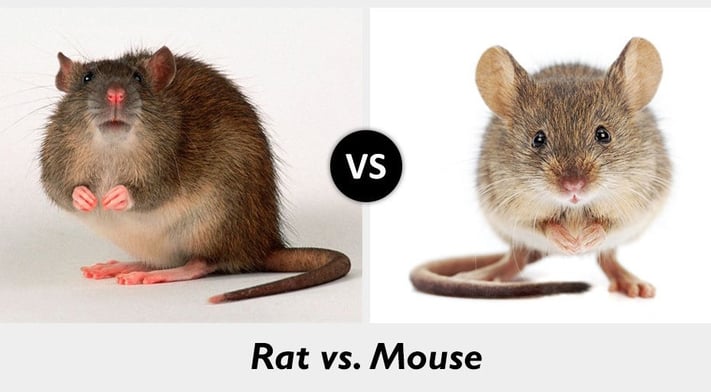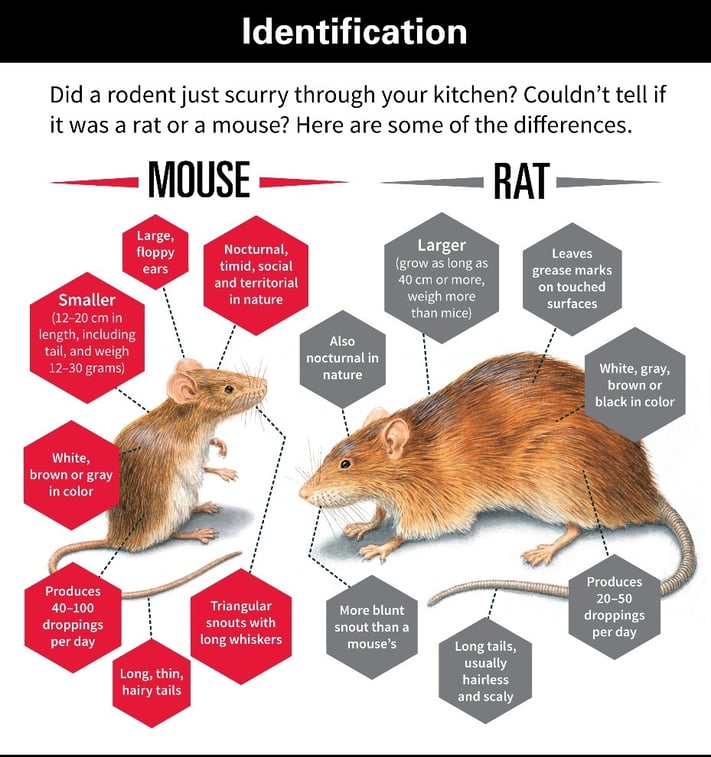How to Tell a Baby Mouse From a Baby Rat
Differences between mice and rats may seem obvious to many, but some of the differences may be more subtle than you think. Of course they both fall into the rodent family and both can cause extensive damage if they invade your home, but if you have them in your home, would you be able to determine which one you have? Depending on which one you may have in your home makes a huge difference when it comes to treating them. If a homeowner has a sufficient amount of time to look at the rodent, they may be able to identify it correctly. However, when you're in your kitchen and see something scurry across your floor your fear and shock may overtake your ability to say "oh that was a mouse" or "oh that was a rat." Then you're left wondering, "was that a mouse or rat?" The typical House Mouse (Mus musculus) is anywhere from two to four inches in length, as opposed to the common, and much larger, Norway Rat which measures seven to nine inches in length. Of course, it may be easy to distinguish between the two if both are at adult size, but a juvenile Norway Rat that has not reached full size can look similar to an adult House Mouse. Mouse vs. Rat comparison chart Photo Credit: Orkin Although coloration of mice and rats are similar, there are a few differences in other features that would help you distinguish between the two. Starting with the snouts of both mice and rats, mice will have more of a triangular nose whereas a rat's nose is blunter. When it comes to ears, mice have large, floppy ears however rats have larger ears in size compared to mice but not in respect to their body size. Mice also tend to have long, thin tails with hair but rat tails will usually be hairless and scaly. Although both rats and mice fall into the rodent category, there are some differences in their behaviors. Even though they are smaller in size, mice tend to be a bit bolder than rats. Mice are usually curious and will explore new things, including traps. It'll take more than a baited trap to trick a rat though. Rats typically live in fear, so they are very cautious about new things and won't explore like mice. It takes rats a lot longer to investigate new things as opposed to mice, which sometimes can make it difficult for trapping. When it comes to nesting, mice are skillful climbers and have no problem inhabiting the attic in your home. Due to their small size, mice can also fit into the smallest of holes, allowing them to access parts of your home you didn't think anything could fit in. Rats, on the other hand, can climb but prefer to inhabit lower levels of a structure, such as a basement or a crawlspace. The fact is that if you have either one of these rodents in your home, the damage can be significant and it is imperative that you have a professional come in and address the situation. Both rats and mice can gnaw on various structures and wires in your home, which can lead to fire hazards. Mice have weaker teeth than rats, which means that any food source that is properly stored in glass or metal can prevent the mice from contaminating it, but that may not be the case with rats. Rats are much stronger than mice and have been known to gnaw through various building materials, including aluminum, wood, glass, sheet metal, and even cinder blocks. Not only can the rodents cause structural damage to your home but they are also a public health pest. "Rodents can cause a lot of damage and can transmit bacteria and other disease agents, so it is best to have the problem taken care of properly and right away," said Dr. Richard Cooper, staff entomologist at Cooper Pest Solutions. Rodent infestations can become huge headaches for homeowners, so it is best to prevent them as early as possible. If you do notice mouse or rat activity in your home, be sure to contact your local pest or rodent removal company before they cause significant damage to your home. At Cooper Pest Solutions we understand how difficult rodents can be to remove and the headaches they cause homeowners, which is why we offer several different services to accommodate your mice and rat removal needs. The One-Time Mouse Control Service will take care of your current rodent problem by eliminating the activity within the home and providing the homeowner with a 90-day coverage plan guarantee. This service is ideal for anyone who is looking for a short-term solution that targets a single pest. Mouse control is now available for scheduling and pre-pay online! Checkout online for contactless scheduling and payment. No inspection needed. The Home Traditional Service is a quarterly maintenance program that offers coverage should you experience a mouse problem and will help to prevent the establishment of mice populations in your home. This plan provides year-round guaranteed coverage against mice and over 20 other common household pests. The Home Intensive Service is also a quarterly maintenance service like the Home Traditional Service. Year-round coverage is provided for not only mice, but more pests than the Home Traditional Service. This is our most popular plan and provides the most protection for your home. Order the Home Traditional Service or the Home Intensive Service online for hassle-free scheduling and contactless checkout! Rodent & Wildlife Exclusion is also available for clients. If you experience recurring problems with mice, squirrels, or other rodents getting into your house, a permanent (and highly recommended) solution is available from Cooper Pest Solutions. Since rodents can squeeze into the tiniest of places, older home structures often have many gaps that rodents find very attractive, and this is how they enter your home. To learn more about Cooper's Rodent & Wildlife Exclusion Services, click here . Rat control plans are also available with an inspection. Because rats are very challenging to control, plans are customized to fit the needs of your home. We understand a homeowner's urgency in addressing rodent problems, which is why we strive to have one of our representatives meet with you the same day or very next day to address your situation. For more information on our rodent control services, call 1-800-949-2667 or fill out our free estimate form.
How Can You Tell a Mouse from a Rat?
Mouse vs. Rat – Size Matters
Mouse vs. Rat – It's all in the Appearance

Rat Behavior vs. Mouse Behavior – Is there a Difference?
Mice vs. Rats – Who Causes More Damage?
Can Rodents Cause Health Problems?
How Can Cooper Pest Solutions Help with Mice and Rats?


How to Tell a Baby Mouse From a Baby Rat
Source: https://www.cooperpest.com/blog/mice-vs-rats
Post a Comment for "How to Tell a Baby Mouse From a Baby Rat"